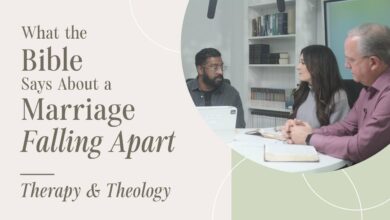When You Discover Someone Has Broken Your Trust | Therapy & Theology with Lysa TerKeurst
When You Discover Someone Has Broken Your Trust | Therapy & Theology with Lysa TerKeurst
Broken trust complicates every aspect of love, especially in relationships where love is meant to be a source of comfort. God designed love to bring comfort to both individuals in a relationship, but when trust is broken or betrayal occurs, it disrupts everything. You can no longer distinguish what’s true from what’s false, and you begin to question whether you ever truly knew the person you trusted. This can feel like a kind of “relational vertigo.” While I’ve never experienced vertigo myself, I’ve been with people who have. They describe it as feeling disoriented, like flashing lights trigger an overwhelming sensation of spinning. You’re unable to be logical; everything around you feels out of control.
I vividly remember my moment of discovery. For me, it wasn’t just a disclosure—it was an ongoing realization. The first words that came out of my mouth were calm and quiet. I didn’t scream or shout. Instead, I said, “This isn’t who you are.” I wasn’t speaking to myself—I was speaking directly to my husband at the time. I wanted him to know that this behavior wasn’t reflective of who he truly was. But the calm quickly shifted, and I found myself retreating into the closet, curling up in a fetal position, wanting the world to disappear. At that moment, I felt incapable of facing the truth, thinking that if I could just hide long enough, the world might somehow right itself.
It was a devastating moment. As I reflect, it’s clear that such emotional upheavals take time to process. Grief, whether from the death of a loved one or the collapse of a relationship, doesn’t always manifest immediately. Sometimes the first reaction is calm, only for the weight of the situation to hit later. People often misunderstand the grieving process, but it’s essential to give time for the full depth of the loss to be felt. Just as you would offer support weeks after the death of a loved one, it’s crucial to understand that emotional healing doesn’t follow a predictable timeline.
The moment of discovery, when trust is broken, reveals the core of our dependence. It highlights where we have placed our trust and reliance, and this realization should not lead to self-blame. Instead, we should approach it with honesty. As theologian John Stott wisely said, “If honesty and humility go together, then pride and insanity go together.” When we face the truth of our dependence, it can feel chaotic. Yet, recognizing where we’ve placed our reliance is crucial to healing.
Marriage, after all, is a deeply dependent relationship. We often lean on our partners emotionally, but that dependence should also be shared with God. As difficult as it may be, acknowledging the need for reliance on a higher power is vital, especially when trust in human relationships has been shaken.
